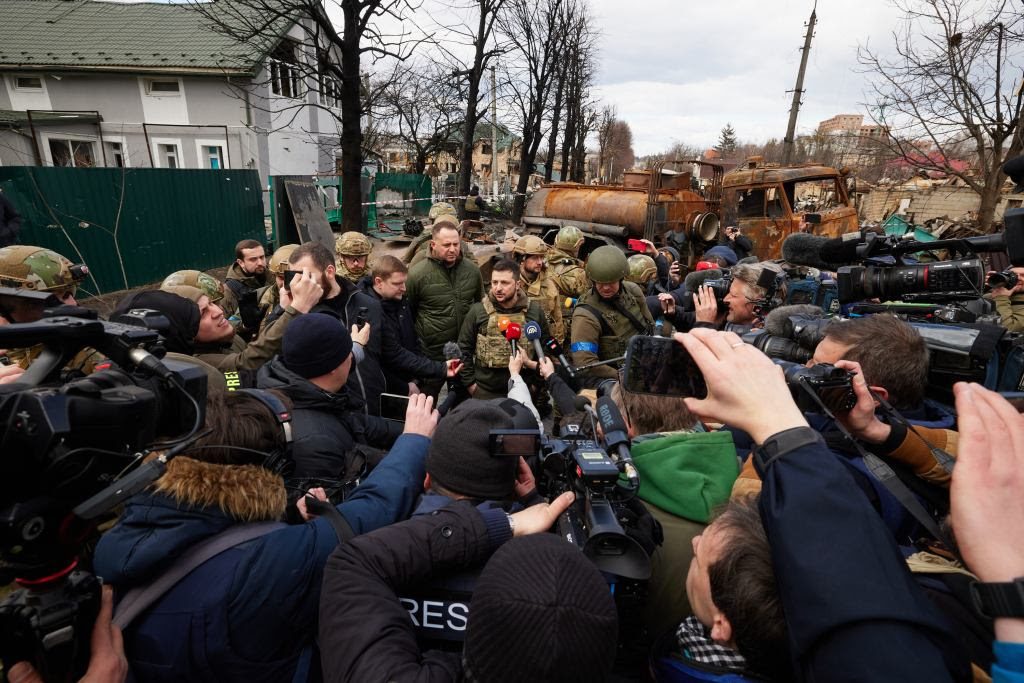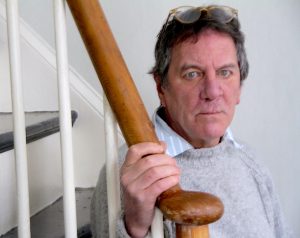Under Every Bed
It has been quite a week for the regime in Kiev. On Sunday Ukrainian President Volodymyr Zelensky suspended the head of his domestic intelligence service, Ivan Bakanov, and the Justice Ministry’s chief prosecutor, Iryna Venediktova. The Verkhovna Rada, Ukraine’s legislature, ratified these suspensions Monday. These two officials are now fired. They both failed, it seems, to root out what the regime is calling treasonous collaborations with Russians.
This is an important development, a push-to-shove moment warranting a careful read. Oh, stop, you are not going to get a careful, contextual read out of The New York Times or any of the other major dailies. The Times is calling this a symptom of “Russian infiltration.” Horse droppings. Infiltration has nothing to do with what appears to be a national crisis. It is a question of what Ukraine is and who Ukrainians are.
Let us go back to where the American media do not care to tread.
The U.S.–cultivated coup of Feb. 21, 2014, was, as a matter of record, the work of a very small minority of Ukraine’s 44 million people—tens of thousands at most. This event instantly alienated the eastern provinces (Donetsk and Luhansk, together the Donbas) where ties with Russia—historical, cultural, linguistic, religious, familial—are long and strong. When they declared themselves independent of the new regime in response to the undemocratic coup that put it in power, Kiev began an eight-year campaign of shelling the cities and towns of the Donbas.
This campaign is mentioned very elliptically, and rarely, in Western media. It resulted in roughly 14,000 civilian fatalities, by the count of the Organization for Security and Cooperation in Europe, more than 80 percent of which were on the Donbas side. There were many reports at this time of Ukrainian soldiers refusing to fire artillery on their compatriots.
I would call the divide between western and eastern Ukraine a fault line, but it did not have to be a fault. It stood to be a fine thing, indeed, if managed properly. This is what the two Minsk accords, signed September 2014 and February 2015, attempted. They were to transform Ukraine into a federated state, although “federal” was a slightly taboo term at the time. The Donbas would enjoy the autonomy it asked for after the coup, its enduring ties with Russia would be recognized, and Ukraine would remain a unified state. It would also enjoy a functioning, inclusive democracy.
But the west-east divide was not managed properly. Among Kiev’s first legislative acts was to remove Russian—spoken by 40 percent of the population—as a national language. Minsk I and Minsk II, long story short, failed when Kiev refused to implement—with Europe’s silent approval—even the most easily achieved of its provisions. The Ukrainian military’s shelling of the east continued without abatement—this while NATO trained 10,000 Ukrainian soldiers a year.
Now we can think about this business of treason and collaboration with clearer minds.
As I read this week’s news reports, I thought back to last August, when one Konstanin Pavlov, the 48-year-old mayor of a small industrial city called Krivoy Rog, was assassinated while sitting on his verandah one evening. Pavlov was a member of a party called Opposition Platform—For Life, whose leader, Viktor Medvedchuk, had recently been arrested. Pavlov’s sin was that of Medvedchuk and their party: They supported improved ties with Russia.
There was no war with Russia at the time of Medvedchuk’s arrest or Pavlov’s assassination, it is worth noting. Medvedchuk was nonetheless charged with treason and Pavlov was nonetheless dead. Starting to get the picture?
Last summer, alert readers will recall, was an eventful season in and around Ukraine. Reports circulated that Ukraine was planning a major offensive—and this would have to be very major—to retake all of the Donbas as well as Crimea. A short time later, as if to confirm these reports, Russia began amassing troops along its southwestern border with Ukraine.
The Times likes to praise American intelligence for its precise call as to when the Russian intervention would begin. This is a game played with mirrors. What indications are available to us suggest persuasively the Ukrainian offensive was to begin in late February; the U.S. knew this because it was directing the endeavor, and the Russians, those dumb, no-neck Russians, understood the moment to move had come.
To be noted: Minsk II legally expired on February 21, eight years to the day after the coup, three days before Russian forces moved.
Zelensky has gone Draconian since the start of hostilities on Feb. 24. The regime has shut down all media it considers “pro–Russian,” censored 100,000 social media accounts it says spread misinformation—and we know all about the disinformation of “misinformation”—and banned no fewer than nine opposition parties, among them Opposition Platform.
In the spring, a small-town administrator in charge of local sports programs, another local bureaucrat who favored a settlement with Russia, was assassinated. Last month the southeastern city of Nikolaev banned the Russian language at all public gatherings. Events such as these give an impression of the prevailing atmosphere.
And now the purge. Apart from Bakanov and Venediktova, Zelensky fired the deputy chief of domestic intel, Bakanov’s No. 2, along with the heads of five regional offices. This is a lot of blood to spill. Safe to say, there does appear to be an extremely rampant problem with Ukrainians who, one way or another, entertain sympathies for Russia, favor negotiations to end the war, or have deep attachments to Russia of the kind earlier suggested.
Those just sacked are accused of not doing enough to find and fire the symps in their organizations. Now we are talking about treasonous Ukrainians in the many thousands. Kiev has already opened nearly 700 investigations against police officers, intelligence operatives, and others. “Russian sympathizers”—The Times’s phrase—are accused of sharing intelligence, reporting potential targets to Russian forces, and sabotaging Ukrainian operations. There are priests—Russian Orthodox priests—giving succor to Russian officers in areas under Russian control.
But, take it from The Times, “Ukrainian society as a whole has rallied to the country’s defense.” I always love these flimsy statements The Times breezily sends our way as if they are beyond dispute. Ukrainian society as a whole, to be perfectly clear, is plainly and profoundly divided in its support for the war and, indeed, the Kiev regime. I have suggested sufficient history such that this cannot be a matter of much dispute.
I do not know what kind of things Ukrainian spooks and ordinary citizens get up to when their sympathies do not lie with the Kiev regime and the NATO–sponsored war it now conducts. And I am not taking The Times’s word for this because The Times gets all its information from the fanatically Russophobic regime—the very height of journalistic delinquency.
However extensive these activities, I will say, they cannot be understood separately from the social and historical context I have pencil-sketched. I begin to suspect the treason and collaboration bit may be cover: So far as I can make out, we are watching what has become a police state extinguish all dissent.
“Such an array of crimes against the foundations of the national security of the state, and the connections detected between the employees of the security forces of Ukraine and the special services of Russia,” the apparently freaked-out Zelensky said Monday, “pose very serious questions to the relevant leadership.”
Big Volod is absolutely right on this point. There are indeed serious questions at issue, but there is no chance whatsoever that the relevant leadership will pose the right ones, given there seem to be Russian-symps under a great many Ukrainian beds.
This mess is the sour fruit of many years of reckless miscalculation, of ignoring the sentiments, preferences, and the very consciousness of half or more of the country.





